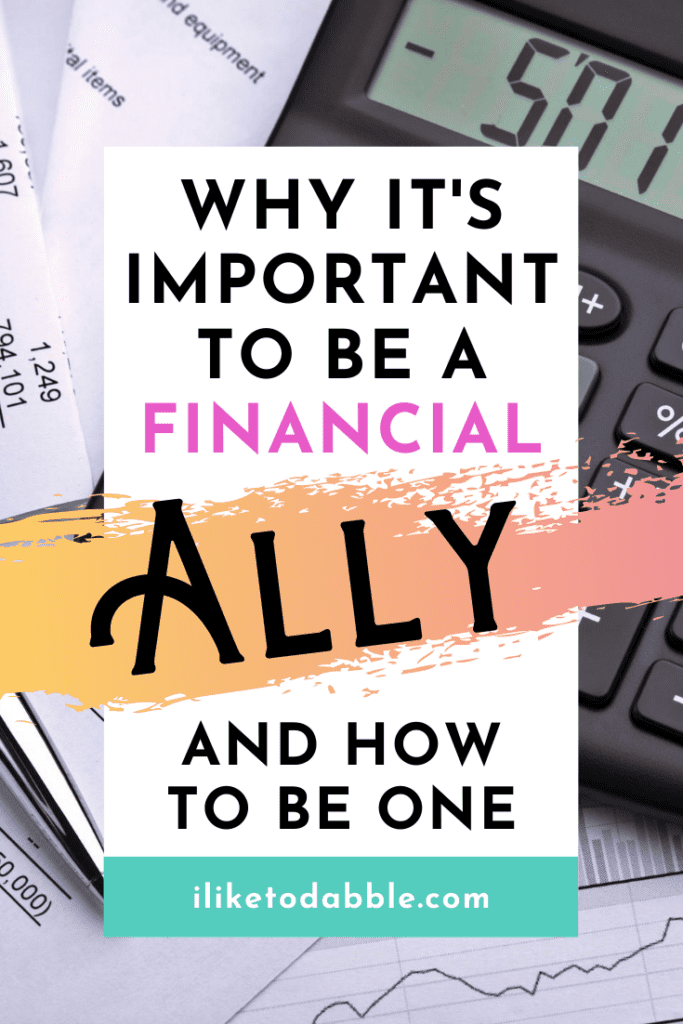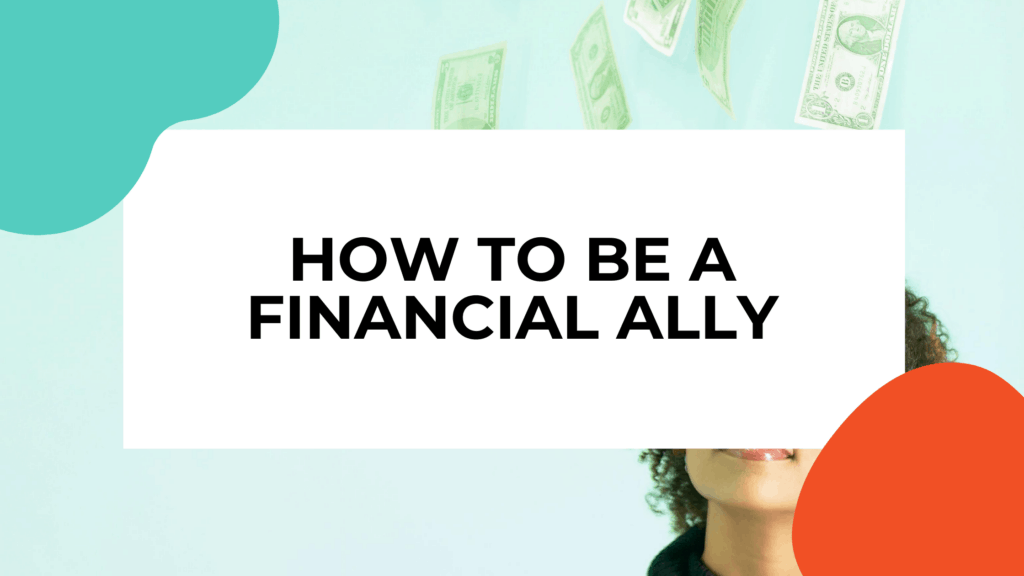Our website is supported by our users and contains affiliate links. We get paid when you purchase or sign up for anything through those links. Read the full disclaimer for more information.
Last Updated on December 3, 2020 by Yovana
I wrote this post in collaboration with Money After Graduation which is where this post was originally published.
When we worked together on this, we were also taking into account the ways we ourselves can also improve. We aren’t perfect and we know we make mistakes, but we are working to constantly improve.
As members of the personal finance community, we are committed to constantly improving the inclusivity of our work. It’s important to be a financial ally and use whatever means you have to recognize and improve the intersectional divides within finance.
Before delving into the importance of financial allyship and the ways you can be a financial ally, I think it is important to define the term. If you Google “financial ally” you will get listings after listings of financial companies and ads for financial companies. There isn’t a definition of “financial ally” you can Google without falling into the void of financial company websites trying to sell you something. A good definition we found was from Michelle Is Money Hungry Podcast.
Michelle Jackson defines a financial ally as:
A person who has access and resources to connect another person or group to financial tools and opportunities that the other individual might not be aware of or have easy access to.
Table of Contents
Why is financial allyship important?
To put it simply: financial allyship is important because wealth and income inequality exist. And marginalized groups and identities face the brunt of these economic issues. Without financial allyship, you are leaving those in need behind (the ones who really need your help).
Making financial literacy more accessible
As personal finance creators and members of this community, it is absolutely important that we are financial allies to each other and to our readers. Not only is it important, but it is our responsibility.
If you only include the readers that look like you, love like you, bank like you, and live like you, you are seeking to help no one. You are creating another echo chamber of privilege that creates more gaps than opportunity.
Get The Monthly Money Mashup
The last Friday of every month I send an email consisting of my favorite posts throughout the financial community, money-related news that helps you, helpful resources, tips, opportunities for free stuff like any giveaways going on, and more!
When “the system” fails those in marginalized communities, they turn to alternative sources for answers
They’ve heard that they don’t have a savings because they spend all their money on “stupid” things. They are told they have no willpower. That they are inferior. There are many reasons why those in marginalized communities don’t have a basic emergency fund, retirement savings, or much of a financial foundation. These circumstances are caused by a system that has completely excluded them.
Race, gender, sexuality, class, disabilities, generational wealth, and more all affect personal finance.
There are many intersecting wage gaps. For example, racialized people earn less than white people, and within that gap there are even more when you consider gender and sexuality. It all comes back to basic access to financial and wealth-building tools that a lot of marginalized communities don’t have. Non-visible minorities have much less investing income. This is just one reason why financial literacy needs to coincide with financial allyship. We have to create resources in accessible ways that don’t already exist.
Acknowledge your financial privilege
When it comes to being a financial ally, you must recognize and acknowledge your privilege. Don’t can’t just state your privilege and move on, either. Show how it can help who you are talking to. Provide something useful.
Your financial literacy is not inclusive if you don’t do this and use an intersectional mindset and language in your work.
What is your financial advice really saying?
We need to first simplify our language and make it more accessible to be able to truly promote financial literacy.
Sometimes people throw around the word “poor” outside of its true meaning. News flash: you’re not poor if your parents pay your rent and you don’t have extra cash for another dinner out this month. The definition of poor is lacking sufficient money to live at a standard considered comfortable or normal in a society. Language is important and needs to be used properly to ensure everyone feels welcome and worthy of what they’re engaging with.
Don’t just tell your audience to save and invest or offer up monthly spending challenges. Use a critical, intersectional mindset to give useful literacy for people of all financial backgrounds. Make it clear that there are options out there for those of us who struggle more beyond the “basics”. Sure, a month of skipping your lattes and seeing how much you’ve saved sounds great. But, some people don’t even have the means to grab a coffee once a month.
Amplify marginalized voices
Your financial allyship lacks value if you are the only voice being heard. Those who are most affected by wealth disparity are always going to be the best at telling their stories and fostering a sense of community for others facing the same issues.
Take a break from your platform for a bit and pass the mic. Especially if you have a large platform. For example, Kara Perez from BravelyGo invited me for an Instagram Stories takeover for Pride Month where we talked about queer money and specifically the several challenges those in the LGBTQIA+ community face financially.
You can share links to people’s businesses, websites, and social media. Or better yet, volunteer for them and buy their stuff! Then tell your friends and families about their businesses and organizations.
Check out this great guide for how to support your favorite businesses for free.
Even if you’re not a part of the personal finance community, allyship is necessary
Your privileges and how you exist in the world politically and socially imply the need to be a financial ally. If you benefit the most by oppressive systems, you should do everything in your power to help change those systems.
Here are some things you can do:
- Speak up against wage gaps in your workplace
- Urge companies to publish salaries
- Write a letter to your employer to urge them to hire more BIPOC , QTPOC , disabled, and other groups that they often overlook. I used this template from Rachel Cargle for holding my employers accountable.
- Call your local policy makers and city council members to push for actions in your local community
- Protest in support of economic equality
If someone calls you out in your efforts to be an ally, hear them out. Always be open to continual learning and tweak your allyship!
Feel free to call us out too.
Open your wallet, please!
One of the best things you can do as a financial ally is to give your money to people who need it. Being inclusive in your financial literacy is important, but people also need money. And this is one of the best ways to offer support.
If you don’t know where to start, consider donating your money here:
- Bail funds are a great place to start because many people end up being stuck in jail because they can’t afford bail. Go here for list of bail funds per city in the U.S.
- The Human Rights Campaign is a national organization in the U.S. that provides financial support for political candidates who support LGBTQ rights
- Immigration Equality is an immigrant rights organization helping LGBTQ and HIV positive immigrants in the United States and around the world find safety and fair treatment.
- True North Aid supports Northern Indigenous communities experiencing poverty.
- Food Banks Canada is a national organization dedicated to helping Canadians living with food insecurity.
It takes time to learn
And that’s okay. As long as you’re willing to do the learning. Being a financial ally means using that time to better understand others’ financial experience and what you can do to help them manage their money within those circumstances, as well as contribute to improving the circumstances.
What are some ways you’ve been a financial ally or other ways that you can think of that we didn’t cover? Let us know in the comments below!
This article was originally published on Money After Graduation and was republished with permission.
Related:
- Why We Need to Be Talking MORE About The LGBTQIA+ Community When We Talk About Money
- How to Support Black Lives Matter
- How The Gig Economy Hurts Black, Indigenous, and People of Color
- How to Protect Your Health and Money as a Gig Worker
- What can I do when I can’t make any extra money due to a disability?
Pin it for later!


Daniella is the creator and author of iliketodabble.com. When their wife Alexandra and them aren’t globetrotting or playing with their 7+ animals, they are dabbling and working towards a future of financial freedom.

